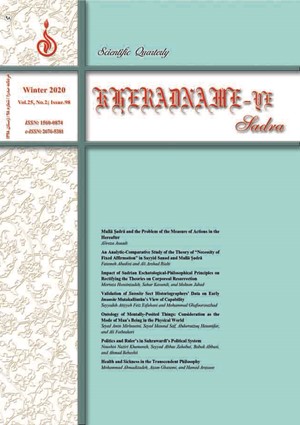-
-
List of Articles
-
Open Access Article
1 - Mullā Ṣadrā and the Problem of the Measure of Actions in the Hereafter
Aireza Asadi -
Open Access Article
2 - Politics and Ruler’s in Suhrawardī’s Political System
Nooshin Naziri khameneh Abbas Zahabi Baabak Abbasi Ahmad Beheshti -
Open Access Article
3 - An Analytic-Comparative Study of the Theory of “Necessity of Fixed Affirmation” in Sayyid Sanad and Mullā Ṣadrā
Fatemeh Abedini Ali Arshad Riahi -
Open Access Article
4 - Impact of Sadrian Eschatological-Philosophical Principles on Rectifying the Theories on Corporeal Resurrection
Morteza Hoseinzadeh Sahar Kavandi Mohsen Jahed -
Open Access Article
5 - Health and Sickness in the Transcendent Philosophy
Mohammad Ahmadizadeh Azam Ghasemi Hamed Arezaee -
Open Access Article
6 - Ontology of Mentally-Posited Things: Consideration as the Mode of Man’s Being in the Physical World
Seyed Amin Mirhoseini -
Open Access Article
7 - Editor's Note
Seyyed Mohammad Khamenei -
Open Access Article
8 - Validation of Sunnite Sect Historiographers’ Data on Early Imamite Mutakallimūn’s View of Capability
Seyyedeh Atiyyeh Feiz Esfahani Mohammad Ghafoorinezhad
-
The rights to this website are owned by the Raimag Press Management System.
Copyright © 2017-2026







